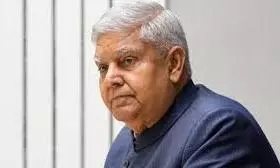
What Dhankhar did - and was done to him
text_fieldsVice President Jagdeep Dhankhar's sudden resignation has raised debates not only in corridors of politics but all across the country. He submitted his resignation to President Droupadi Murmu at an unearthly hour on Monday night, citing health reasons. On Tuesday afternoon, the Rashtrapati Bhavan announced that it had been accepted. There are two notable things about it. First, if the second citizen of India announces his resignation suddenly without any warning or hint, it is normal for the ruling leadership to try to dissuade him from the move. At least there will be direct communication in this regard. There was no attempt for either. Second, there was no indication of any health problems in the context of the events he attended and was scheduled to attend as Rajya Sabha Chairman. He has not discussed the resignation with the ruling party leadership that elected him to this post. So the opposition's observation that there is something beyond all this behind this decision is not without substance.
Also read: Today's political atmosphere 'unfavourable' to Indian democracy: Dhankar
A Vice President resigning for mysterious reasons does not speak well for Indian democracy. Till Monday afternoon, Dhankhar was active, presiding over the proceedings of the monsoon session of the Rajya Sabha. He announced that the impeachment notice filed by the Opposition against Delhi High Court judge Yashwant Verma in the case of finding currency notes from his house has been accepted and sent to the house secretariat for action. At the same time, the ruling party had initiated a similar step in the Lok Sabha in conjunction with the Opposition. However, it is pointed out that allowing the Opposition to score points in this way in the Rajya Sabha angered the ruling party. And it was the Vice President who paved the way for this. Later, he also chaired the Advisory Committee of the House. However, he was unhappy that the ruling party representatives, ministers J.P. Nadda and Kiren Rijiju, did not arrive at 4.30 pm when the committee was scheduled to meet again. In addition, Nadda's earlier remarks during a House proceeding were in a way that belittled him. During an argument with the Opposition, Nadda's remarks were disrespectful to the Chair, implying that only what he said would be on the House record. And it would not be wrong to conclude that this reflected a hegemonic mentality of the ruling establishment to the displeasure of the Vice President.
Also read: New Vice President: Shashi Tharoor in line....?
Dhankhar, who had a record as a senior advocate in the High Court before becoming first the Governor of West Bengal and later the Vice President and had been a member of the Indian National Congress and Janata Dal. He was made Governor after joining the BJP. There, on many an occasion he locked horns with the BJP's rival Trinamool Congress government. While serving as the Chairman of the Rajya Sabha, he had clashes with the Opposition Congress several times. The Congress criticised him alleging discrimination and pro-government stances in the conduct of the House business. They also complained that he did not give enough opportunities to the Opposition. In addition, he had blamed the judiciary several times for overriding Parliament in lawmaking. His sharp reactions on this score were mostly on the Supreme Court's decision to strike down legislation passed by Parliament on the grounds that it was against the basic structure of the Constitution - such as the formation of the Supreme Court's collegium and the court's stance regarding the delay in signing bills by governors and the President. He even said that if things were going in that direction, it would be better to dissolve Parliament itself.
Also read: Preamble 'not changeable', but was 'changed' during Emergency: Dhankhar
The Opposition had filed a no-confidence motion against Dhankhar in protest at the denial of opportunity. There is also an observation that he resigned to avoid an extraordinary situation of the House discussing that. However, none of this prevented him from taking a neutral stand on issues like the impeachment of a judge raised by the Opposition. On the one hand, that must have angered the ruling party. And it was probably this disillusionment of the ruling party with Dhankhar that was reflected in Prime Minister Modi's merely formal and cold reaction on the resignation in his X post. That response, which was miserly in words, patently lacked any warmth.
Also read: Vice President criticises misguided reactions to Sanatan and Hindu references
This is the first time in the history of the Republic that a Vice President has resigned in this manner in the middle of his tenure. Previously, Vice Presidents had resigned to contest different elections. In that sense, this can be said to have dimmed the glow of Indian parliamentary democracy. While moving forward putting behind this unpleasant incident that has occurred, political parties should see beyond ideological differences and above the polemics in the parliament, and also be vigilant to prevent a repeat of incidents that diminish the glory of the world's largest democracy.
Also read: Opposition submits notice for no-confidence motion against VP Dhankhar












